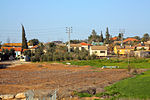Tell es-Safi

Tell es-Safi (Arabic: تل الصافي, romanized: Tall aṣ-Ṣāfī, "White hill"; Hebrew: תל צפית, Tel Tzafit) was an Arab Palestinian village, located on the southern banks of Wadi 'Ajjur, 35 kilometers (22 mi) northwest of Hebron which had its Arab population expelled during the 1948 Arab–Israeli war on orders of Shimon Avidan, commander of the Givati Brigade. Archaeological excavations show that the site (a tell or archaeological mound) was continuously inhabited since the 5th millennium BCE. It appears on the Madaba Map as Saphitha, while the Crusaders called it Blanche Garde. It is mentioned by Arab geographers in the 13th and 16th centuries. Under the Ottoman Empire, it was part of the district of Gaza. In modern times, the houses were built of sun-dried brick. The villagers were Muslim and cultivated cereals and orchards. Today the site, known as Tel Tzafit, is an Israeli national park incorporating archaeological remains which some have identified as the Philistine city of Gath, mentioned in the Bible. The remains of the Crusader fort and the Arab village can also be seen on the tell.
Excerpt from the Wikipedia article Tell es-Safi (License: CC BY-SA 3.0, Authors, Images).Tell es-Safi
Trans-Israel Highway, Yoav Regional Council
Geographical coordinates (GPS) Address Nearby Places Show on map
Geographical coordinates (GPS)
| Latitude | Longitude |
|---|---|
| N 31.704166666667 ° | E 34.846944444444 ° |
Address
Gat city apron
Trans-Israel Highway
Yoav Regional Council
South District, Israel
Open on Google Maps











